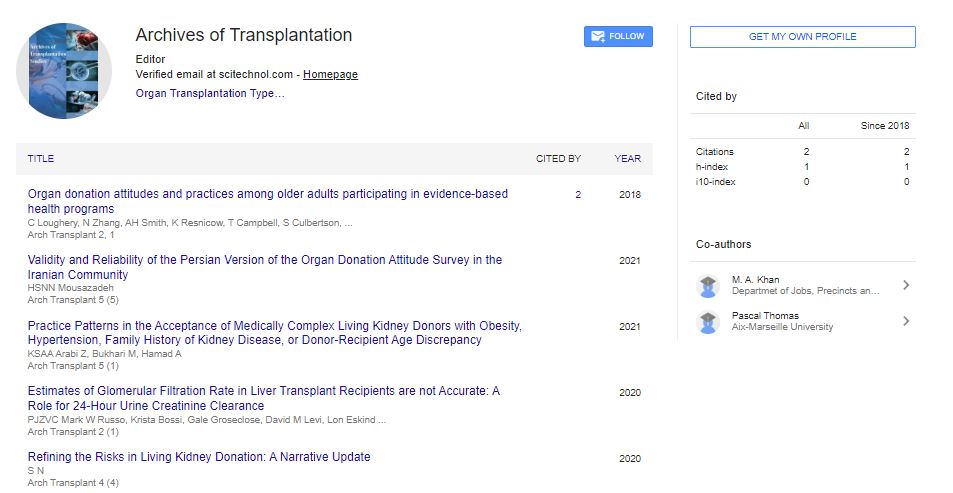Perspective, Arch Transplant Vol: 7 Issue: 1
Artificial Organ Transplantation: A New Era in Medical Science
Taolian Yang*
Department of Radiological Science, University of Gondar, Gondar, Ethiopia
*Corresponding Author: Taolian Yang
Department of Radiological Science, University of Gondar, Gondar, Ethiopia
E-mail: yangt45@gmail.com
Received date: 18 February, 2023, Manuscript No. AT-23-96348;
Editor assigned date: 20 February, 2023, PreQC No. AT-23-96348 (PQ);
Reviewed date: 06 March, 2023, QC No. AT-23-96348;
Revised date: 13 March, 2023, Manuscript No. AT-23-96348 (R);
Published date: 20 March, 2023, DOI: 10.4172/AT.1000130
Citation: Yang T (2023) Artificial Organ Transplantation: A New Era in Medical Science. Arch Transplant 7:1.
Description
The field of medical science has seen many breakthroughs over the years, but perhaps none more significant than the development of artificial organ transplantation. This revolutionary new technology has the potential to save countless lives by providing a solution for those suffering from organ failure. In this article, we will explore the science behind artificial organ transplantation, its benefits, and its limitations.
What is artificial organ transplantation?
Artificial organ transplantation is the process of replacing a failed or damaged organ with an artificial one. These devices are formed using a combination of biocompatible materials and engineering technology. The goal is to produce a device that can perform the same functions as a natural organ, but without the risk of rejection or other complications associated with traditional organ transplants.
Artificial organs are currently being developed for a variety of applications, including the heart, lungs, kidneys, and liver. Each device is designed to mimic the structure and function of the natural organ it is replacing, using a combination of mechanical and biological components.
Benefits of artificial organ transplantation
The primary benefit of artificial organ transplantation is the ability to provide a solution for those suffering from organ failure. This includes patients with chronic conditions such as heart disease, kidney disease, and liver disease. By providing an artificial organ, these patients can live longer and enjoy a better quality of life than they would with traditional treatments.
Artificial organs also offer several advantages over traditional organ transplants. One of the biggest advantages is the reduced risk of rejection. Since the device is made from biocompatible materials, the body is less likely to recognize it as a foreign object and mount an immune response.
Another advantage of artificial organs is the ability to customize the device to the patient's specific needs. This means that each device can be tailored to the patient's unique anatomy, reducing the risk of complications and improving overall outcomes.
Limitations of artificial organ transplantation
While artificial organ transplantation holds great promise, it is not without its limitations. One of the biggest challenges is developing a device that can mimic the complex functions of a natural organ. The human body is incredibly complex, and replicating the functions of an organ requires a deep understanding of its biology and physiology.
Another challenge is ensuring the safety and reliability of the device. Since artificial organs are still in the early stages of development, there is a risk of complications and failure. It will take time and extensive testing to ensure that these devices are safe and effective for widespread use.
Future of artificial organ transplantation
Despite the challenges, the future of artificial organ transplantation looks bright. Scientists and engineers are working tirelessly to develop new devices and improve existing ones. As technology continues to advance, we can expect to see even more sophisticated and effective devices in the coming years.
One of the most promising areas of research is the use of stem cells to create artificial organs. By using a patient's own cells, scientists can create a device that is less likely to be rejected and more closely mimics the structure and function of a natural organ.
Conclusion
Artificial organ transplantation is a revolutionary new technology that has the potential to transform the field of medical science. By providing a solution for those suffering from organ failure, these devices can improve outcomes and save countless lives. While there are still challenges to overcome the new field of research.
 Spanish
Spanish  Chinese
Chinese  Russian
Russian  German
German  French
French  Japanese
Japanese  Portuguese
Portuguese  Hindi
Hindi 